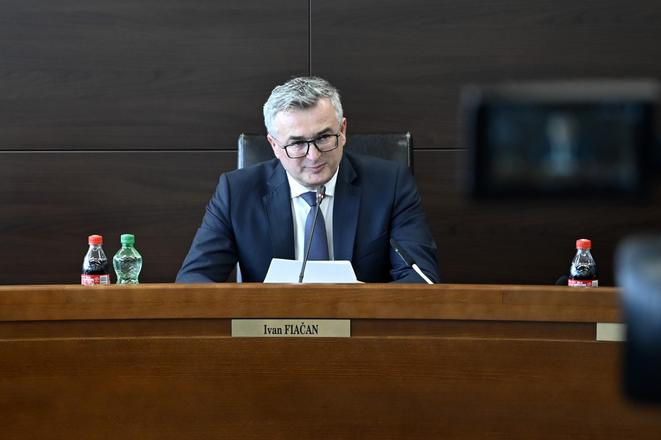On Wednesday evening the Constitutional Court upheld the ruling coalition’s mid-March abolition of the Special Prosecutor’s Office, a body that had overseen the investigation of serious crimes and high-profile corruption, declaring no constitutional violation.
“It does not disrupt the Slovak prosecution system or international obligations, as the agenda of the Special Prosecutor’s Office is taken over by other units under the General Prosecutor’s Office,” the court said on July 3.
The court added that similar institutions to the Special Prosecutor’s Office exist in other countries, thereby refuting the coalition’s claim.
The scrapping of the anti-corruption body, which had also handled the corruption cases of people linked to the ruling coalition of three parties (Smer, Hlas, Slovak National Party), was one of many changes to criminal laws passed by coalition MPs on February 8. The accused people, including PM Robert Fico’s adviser Daniel Lindtner, helped write the amendments. Fico often claimed that the office, which was led by Fico’s former political opponent Daniel Lipšic in the past few years, violated human rights, was unfixable, and attempted to destroy Smer. Fico repeatedly insulted the prosecutors working under Lipšic.
“We will definitely file various criminal complaints and motions, as the criminal liability must be examined to determine whether these individuals have committed the crime of the abuse of power by a public official,” Fico announced in March.
In the end, some top prosecutors decided to quit their jobs, while others are no longer working on serious crimes following the decision of controversial General Prosecutor Maroš Žilinka.
For the adopted changes, which some experts and the European Commission have warned against, the opposition and President Zuzana Čaputová turned to the Constitutional Court soon after the coalition passed the changes, and despite the coalition’s attempt to prevent the Constitutional Court from having a say in the matter by delaying the publication of new changes in the collection of laws.
In late February, the court suspended extensive changes to the country’s criminal laws, including all the changes to the Penal Code and the Act on Criminal Liability of Legal Entities, as well as several changes to the Criminal Procedure Law. The court saw a danger in reducing penalties, shortening the statutes of limitations, as well as rewriting the criminal damage classification; but also in reopening previously approved plea bargains and using illegally obtained evidence in a criminal proceeding only in favour of the accused.
In February, at first, the PM seemed to be satisfied with the decision because the court did not suspend the section on the abolition of the Special Prosecutor’s Office. A few days later, Fico criticised the court’s president Ivan Fiačan. Fico went on to opine that Fiačan should have been removed from his presiding post. One of the reasons, Fico argued, was the leak of information about the suspension of the changes’ effectiveness, for which Fiačan apologised.
“If I had the power to remove the President of the Constitutional Court, I would remove him,” Fico said.
The Constitutional Court announces its decision on July 3, 2024 (video)
Adopted changes may help Smer people
On July 3, the court announced that the following changes were unconstitutional: the reopening of plea bargains approved before March 15 (the date when the new changes took effect, ed.), the use of illegally obtained evidence only to help the accused, as well as transitional provisions regarding the issue of asset forfeiture and the statutes of limitations in ongoing criminal cases, which are more favourable towards the accused.
Last year, the Constitutional Court ruled that the mandatory forfeiture of property is unconstitutional in some cases. However, in ongoing cases, oligarchs can still lose their property.



 President of the Constitutional Court, Ivan Fiačan, during a press briefing on the decision of the Constitutional Court regarding the amendments to criminal laws on July 3, 2024 in Košice, eastern Slovakia. (source: TASR)
President of the Constitutional Court, Ivan Fiačan, during a press briefing on the decision of the Constitutional Court regarding the amendments to criminal laws on July 3, 2024 in Košice, eastern Slovakia. (source: TASR)
